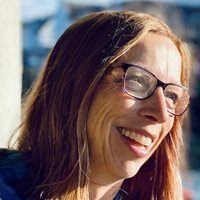
Caroline King
Caroline is now a board member of both WPF Therapy, a small charity who provide affordable psychotherapy, and Affinity Trust, a £57m income organisation that provides supported living for people with learning disabilities. This is a paid role.
A STEP-BY-STEP APPROACH TO GETTING MY FIRST BOARD ROLES
Here we ask Caroline about her approach which successfully gained her not one, but two, third sector roles.
What was your starting point?
I had just retired after 33 years in the same company, with an HR/supply chain mix of experience. I’d held no committee or volunteering posts in the last 15 years, it was all work, work, work.
I want to make the most of the flexibility I gain in retirement, but I also have loads of energy. I want to use this phase of my career to “give back” and I love using my leadership skills. I therefore decided to go for a charity trusteeship, rather than a business NED role.
What was your confidence level going in?
Quite low, to be honest. I had oodles of operational corporate executive experience, and only indirect board experience. Why would they want ME? How could I possibly pivot my skills and experience to be attractive to a charity board?
I applied to the second one while awaiting the outcome of the first one. I had heard the message loud and clear that I should expect some rejections, so this was me dipping my toe in the water, not expecting for a moment to get either offer!
How did you prepare your applications?
Women on Boards was recommended to me by a friend who secured a paid NED role just prior to me starting my search. She had found the 1-on-1 Board CV support really valuable in gaining her role, and shared her advice. I then did the Board CV webinar which guided me in distilling my “Value-Add” for a board.
“I also shared my Board CV with lots of friends and family and incorporated all the varied feedback. This was hard to do as it felt embarrassing, but they see different traits in me than I do. It was so valuable to hear what I was over-playing and under-playing.”
What support did you get?
My networking conversations after a couple of the Women on Boards Member webinars proved very fruitful. For example, one member who already had an elevator speech and shared it with me. It was so helpful and triggered some more ideas for me in terms of what I wanted in a role, as well as how to craft my elevator speech
I also engaged a life coach for 4 sessions which coincided with getting myself prepared for key steps of the process – CV, covering letter, interview and then thinking about how I want to show up at a board meeting in Sept. This was a great way to talk through all the internal issues I was having in my own mind and come up with some reframed beliefs and a plan for each step
I also joined the inaugural Interview Prep webinar led by Rachel Tranter, about two weeks before my first interview. Rachel was so brilliantly warm and it was so encouraging to hear “if you have an interview, congratulations, you have already met the requirements”. I gained several actionable tips that I was able to put into practice – with good results!
How much did you know about the charity sector?
I had no direct experience in the charity sector so knew I needed to do some research. At the Boardroom Insights event on Charity Sector. I learned some new things that are relevant to trustees on charities, and built that into my interview preparation.
Another Women on Boards’ member who has lots of trustee experience has also kindly shared advice, particularly in how to approach my first and subsequent board meetings. She gave me two further contacts and the three conversations have been so rich in providing a broad view of what I might experience and options for how I show up. This has been important for me, as I want to start right and also start with confidence.
What made the difference in getting appointed?
They want the skills I bring (who knew?!), and not just the ones they were seeking directly. For example, WPF Therapy were seeking a diversity and inclusion trustee (which is my HR specialism), but have asked me to focus on my business process and operational experience, which I am very happy about.
In my feedback for both roles, they said they appreciated that I had taken the time to really get to know the organisation before coming to the interview. And I smiled in the interview – which apparently not all candidates do!
What’s next?
I only intended to do one trustee role, but having landed both I’ve decided to do both and build my skills and experience faster. I have my first board meetings for both in September 2021 and intend to remain an active Women on Boards member to continue my learning.
Overall, I am extremely excited to be stepping into new roles where I can make a difference to others and grateful for the support I have received along the way.